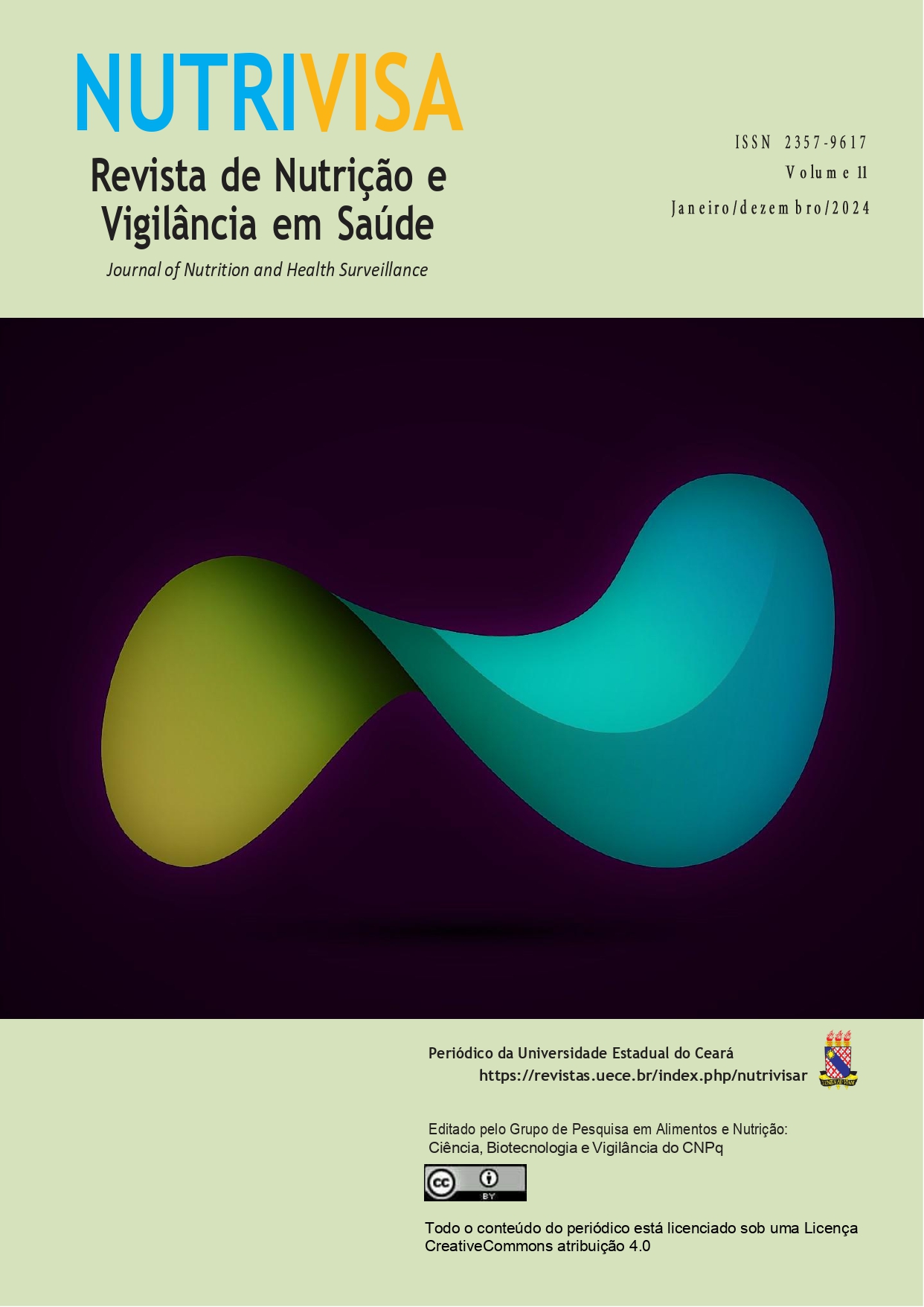GOALS DEVELOPED BY WOMEN WITH EXCESS WEIGHT THROUGH MOTIVATIONAL INTERVIEWING
DOI:
https://doi.org/10.52521/nutrivisa.v11i1.14453Palavras-chave:
eating behavior; motivational interviewing; obesity management; postpartum period.Resumo
Motivational interviewing is a technique used to help individuals commit to behavior changes, particularly in weight control. This study aimed to analyze the goals established by overweight postpartum women who received nutritional counseling through motivational interviewing. It is a descriptive study conducted with the intervention group of a randomized clinical trial in Primary Health Care Units in Fortaleza-CE, Brazil. A total of 32 women participated, with a Body Mass Index ≥ 25 kg/m², a high school education, an average age of 30 years, and who were between the first and third months postpartum and breastfeeding. The women attended biweekly motivational interviewing sessions conducted by nutritionists and received guidance based on the Dietary Guidelines for the Brazilian Population for up to six months. Data analysis considered the types of goals chosen, their achievement, and levels of motivation and confidence. The most frequent goal was incorporating fruits, vegetables, and greens into their diet (34.6%). The highest motivation was observed for reducing soft drinks and sweets (15.4%), a goal that also received the highest confidence score (8.5) but was not achieved by any participant. Despite high levels of motivation and confidence, most planned goals were not accomplished. Therefore, motivational interviewing may help identify key dietary behaviors for managing excess weight, even in the face of challenges in goal execution.
Referências
ADAMSKI, M.; GIBSON, S.; LEECH, M.; TRUBY, H. Are doctors nutritionists? What is the role of doctors in providing nutrition advice? Nutrition Bulletin, v. 43, p. 147-152, 2018. doi: https://doi.org/10.1111/nbu.12320.
ALDERETE, T. L.; WILD, L. E.; MIERAU, S. M.; BAILEY, M. J.; PATTERSON, W. B.; BERGER, P. K.; JONES, R. B.; PLOWS, J. F.; GORAN, M. I. Added sugar and sugar-sweetened beverages are associated with increased postpartum weight gain and soluble fiber intake is associated with postpartum weight loss in Hispanic women from Southern California. American Journal of Clinical Nutrition, v. 112, n. 3, p. 519-526, 2020. doi: https://doi.org/10.1093/ajcn/nqaa156.
ALVES, M. M. C.; SALVIANO, A. F.; BRITO, L. F.; CARIOCA, A. F. C.; AZEVEDO, D. V. Food changes of nursing mothers during breastfeeding. Nutrição Clínica e Dietética Hospitalar, v. 38, n. 4, p. 49-56, 2018. doi: https://doi.org/10.12873/384marly.
ANDRADE, G. C.; JULIA, C.; DESCHAMPS, V.; SROUR, B; HERCBERG, S.; KESSE-GUYOT, E.; ALLÈS, B.; CHAZELAS, E.; DESCHASAUX, M.; TOUVIER, M.; MONTEIRO, C. A.; LEVY, R. B. Consumption of ultra-processed food and its association with sociodemographic characteristics and diet quality in a representative sample of French adults. Nutrients, v. 13, n. 2, p. 682, 2021. doi: https://doi.org/10.3390/nu13020682.
BARNES, R. D.; IVEZAJ, V. A systematic review of motivational interviewing for weight loss among adults in primary care. Obesity Reviews, v. 16, n. 4, p. 304-318, 2015. doi: https://doi.org/10.1111/obr.12264.
BRAZIL. Ministry of Health of Brazil. Dietary guidelines for the Brazilian population. Brasília: Ministry of Health of Brazil, 2015. 150 p.: il.
BRAZIL. Ministry of Health of Brazil. Vigitel Brazil 2021: surveillance of risk and protective factors for chronic diseases by telephone survey: estimates of frequency and sociodemographic distribution of risk and protective factors for chronic diseases in the capitals of the 26 Brazilian states and the Federal District in 2021. Brasília: Ministry of Health of Brazil, 2021. 128 p.
BRAZIL. Ministry of Health. Guidelines for the collection and analysis of anthropometric data in health services: Technical Standard of the Food and Nutritional Surveillance System – SISVAN. Brasília, DF: Ministry of Health, 2011. 76 p. (Series G. Health Statistics and Information).
BRAZIL. Ministry of Health. Recommendations for increasing consumption of fruits, vegetables, and greens. Brasília: Ministry of Health, 2022. 20 p.: il.
BRITO, S. M.; SANTANA, J. M.; PEREIRA, M.; SANTOS, D. B.; OLIVEIRA, A. M. Post-partum weight retention in Northeastern Brazilian women: a prospective NISAMI cohort study. São Paulo Medical Journal, v. 142, n. 2, p. e2023084, 2024. https://doi.org/10.1590/1516-3180.2023.0084.R1.010623
BUKHSH, A.; GOH, B.-H.; ZIMBUDZI, E.; LO, C.; ZOUNGAS, S.; CHAN K-G; KHAN, T. M. Type 2 diabetes patients' perspectives, experiences, and barriers toward diabetes-related self-care: a qualitative study from Pakistan. Frontiers in Endocrinology, v. 11, p. 534873, 2020. doi: https://doi.org/10.3389/fendo.2020.534873.
CLARO, R. M.; MONTEIRO, C. A. Family income, food prices, and household purchases of fruits and vegetables in Brazil. Journal of Public Health, v. 44, n. 6, p. 1014-1020, 2010. doi: https://doi.org/10.1590/s0034-89102010000600005.
DING, G.; NIU, L.; VINTURACHE, A.; ZHANG, J.; LU, M.; GAO, Y.; PAN, S.; TIAN, Y. "Doing the month" and postpartum depression among Chinese women: A Shanghai prospective cohort study. Women and Birth, v. 33, n. 2, p. e151-e158, 2020. doi: https://doi.org/10.1016/j.wombi.2019.04.004.
DING, Y.; INDAYATI, W.; BASNET, T. B.; LI, F.; LUO, H.; PAN, H.; WANG, Z. Dietary intake in lactating mothers in China 2018: Report of a survey. Nutrition Journal, v. 19, n. 1, p. 72, 2020. doi: https://doi.org/10.1186/s12937-020-00589-x.
DUNKER, K.; ALVARENGA, M.; TIMERMAN, F. Fundamentos e técnica da entrevista motivacional para nutrição. In: ALVARENGA, M.; FIGUEIREDO, M.; TIMERMAN, F. (Org.). Nutrição comportamental. 2. ed. Barueri, SP: Manole, 2019. p. 201-226.
FARIA-SCHÜTZER, D. B.; SURITA, F. G.; RODRIGUES, L.; PAULINO, D. S.M.; TURATO, E. R. Self-care and health care in postpartum women with obesity: a qualitative study. Revista Brasileira de Ginecologia e Obstetrícia, v. 42, n. 1, p. 19-25, 2020. doi: https://doi.org/10.1055/s-0039-3400456.
FIGUEIREDO, N.; MAIA, E. G.; SILVA, L. E. S.; GRANADO, F. S.; CLARO, R. M. Trends in sweetened beverages consumption among adults in the Brazilian capitals, 2007–2016. Public Health Nutrition, v. 21, n. 18, p. 3307-3317, 2018. doi: https://doi.org/10.1017/S1368980018002161.
GRAHAM, M.; UESUGI, K.; OLSON, C. Barriers to weight-related health behaviours: a qualitative comparison of the socioecological conditions between pregnant and post-partum low-income women. Maternal and Child Nutrition, v. 12, n. 2, p. 349-361, 2016. doi: https://doi.org/10.1111/mcn.12135.
HOEDJES, M.; BERKS, D.; VOGEL, I.; FRANX, A.; DUVEKOT, J. J.; OENEMA, A.; STEEGERS, E. A.; RAAT, H. Motivators and barriers to a healthy postpartum lifestyle in women at increased cardiovascular and metabolic risk: a focus-group study. Hypertension in pregnancy, v. 31, n. 1, p. 147-155, 2012. doi: https://doi.org/10.3109/10641955.2010.544803
JARDI, C.; APARÍCIO, E.; BEDMAR, C.; ARANDA, N.; ABAJO, S.; MARCH, G.; BASORA, J.; ARIJA, V. Food consumption during pregnancy and post-partum: ECLIPSES Study. Nutrients, v. 11, n. 10, p. 2447, 2019. doi: https://doi.org/10.3390/nu11102447.
KAY, M. C.; WASSER, H.; ADAIR, L. S.; THOMPSON, A. L.; SIEGA-RIZ, A. M.; SUCHINDRAN, C. M.; BENTLEY, M. E. Consumption of key food groups during the postpartum period in low-income, non-Hispanic black mothers. Appetite, v. 117, p. 161-167, 2017. doi: https://doi.org/10.1016/j.appet.2017.06.023.
KEEFE, R. H.; BROWNSTEIN-EVANS, C.; POLMANTEER, R. S. R. The challenges of idealized mothering: marginalized mothers living with postpartum. Affilia, v. 33, n. 2, p. 221-235, 2018. doi: https://doi.org/10.1177/0886109917747634.
LAMAS, I.; CADETE, M. M. M. From desire to action: factors interfering in the nutritional approach to change food habit. Revista de Enfermagem da UFPE on line, v. 11, n. 6, p. 2432-2444, jun. 2017. doi: https://doi.org/10.5205/reuol.10827-96111-1-ED.1106201724.
LEWIS, M.; HERRON, L. M.; CHATFIELD, M. D.; TAN, R. C.; DALE, A.; NASH, S.; LEE, A. J. Healthy food prices increased more than the prices of unhealthy options during the COVID-19 pandemic and concurrent challenges to the food system. International Journal of Environmental Research and Public Health, v. 20, n. 4, p. 3146, 2023. doi: https://doi.org/10.3390/ijerph20043146.
MALHOTRA, A.; VERMA, A.; KAUR, D.; RANJAN, P.; KUMARI, A.; MADAN, J. A stepwise approach to prescribe dietary advice for weight management in postpartum and midlife women. Journal of Obstetrics and Gynaecology India, v. 72, n. 2, p. 114-124, 2022. doi: https://doi.org/10.1007/s13224-022-01643-w.
MCKINLEY, M. C.; ALLEN-WALKER, V.; MCGIRR, C.; ROONEY,C.; WOODSIDE, J. V. Weight loss after pregnancy: challenges and opportunities. Nutrition Research Reviews, v. 31, n. 2, p. 225-238, 2018. doi: https://doi.org/10.1017/S0954422418000070.
MICHALOPOULOU, M.; FERREY, A. E.; HARMER, G.; GODDARD, L.; KEBBE, M.; THEODOULOU, A.; JEBB, S. A.; AVEYARD, P. Effectiveness of motivational interviewing in managing overweight and obesity: A systematic review and meta-analysis. Annals of Internal Medicine, v. 175, n. 6, p. 838-850, 2022. https://doi.org/10.7326/M21-3128
MILLER, W. R.; ROLLNICK, S. Motivational interviewing: helping people change. 3. ed. New York: Guilford Press, 2013.
MILLER, W. R.; ROLLNICK, S. Motivational interviewing: preparing people for change. 2nd ed. New York: Guilford Press, 2002.
MILLER, W. R.; ROLLNICK, S. Ten things that motivational interviewing is not. Behavior and Cognitive Psychotherapy, v. 37, n. 2, p. 129-140, 2009. doi: https://doi.org/10.1017/S1352465809005128.
MILLER, W. R.; ROSE, G. S. Toward a theory of motivational interviewing. American Psychologist, v. 64, n. 6, p. 527-537, 2009. doi: https://doi.org/10.1037/a0016830.
NIGHTINGALE, H.; MNATZAGANIAN, G.; HOOKER, L.; BARRETT, S.; KINGSLEY, M. The effect of motivational interviewing and/or cognitive behaviour therapy techniques on gestational weight gain–a systematic review and meta-analysis. BMC public health, v. 23, n. 1, p. 626, 2023. https://doi.org/10.1186/s12889-023-15446-9.
PATEL, M. L.; WAKAYAMA, L. N.; BASS, M. B.; BRELAND, J. Y. Motivational interviewing in eHealth and telehealth interventions for weight loss: a systematic review. Preventive Medicine, v. 126, p. 105738, 2019. doi: https://doi.org/10.1016/j.ypmed.2019.05.026.
PENG, J.; XU, T.; TAN, X.; HE, Y.; ZENG, Y.; TANG, J.; SUN, M. Eating styles profiles and correlates in Chinese postpartum women: a latent profile analysis. Nutrients, v. 16, n. 14, p. 2299, 2024. https://doi.org/10.3390/nu16142299
PEREIRA, L. C. R.; ELLIOTT, S. A.; MCCARGAR, L. J.; BELL, R. C.; ROBSON, P. J.; PRADO, C. M. Associations of appetite sensations and metabolic characteristics with weight retention in postpartum women. Applied Physiology, Nutrition, and Metabolism, v. 45, n. 8, p. 875-885, 2020. https://doi.org/10.1139/apnm-2019-0809
SUIRE, K. B.; KAVOOKJIAN, J.; FEISS, R.; WADSWORTH, D. D. Motivational interviewing for weight management among women: a meta-analysis and systematic review of RCTs. International Journal of Behavioral Medicine, v. 28, n. 4, p. 403-441, 2021. doi: https://doi.org/10.1007/s12529-020-09934-0.
WALLACE, T. C.; BAILEY, R. L.; BLUMBERG, J. B.; BURTON-FREEMAN, B.; CHEN, C-Y. O.; CROWE-WHITE, K. M.; DREWNOWSKI, A.; HOOSHMAND, S.; JOHNSON, E.; LEWIS, R.; MURRAY, R.; SHAPSES, S. A.; WANG, D. D. Fruits, vegetables, and health: A comprehensive narrative, umbrella review of the science and recommendations for enhanced public policy to improve intake. Critical Reviews in Food Science and Nutrition, v. 60, n. 13, p. 2174-2211, 2020. doi: https://doi.org/10.1080/10408398.2019.1632258.
WESTRA, H. A.; NOROUZIAN, N. Using motivational interviewing to manage process markers of ambivalence and resistance in cognitive behavioral therapy. Cognitive Therapy and Research, v. 42, n. 2, p. 193-203, 2018. doi: https://doi.org/10.1007/s10608-017-9857-6.
WHARTON, S.; LAU, D. C. W.; VALLIS, M.; SHARMA, A. M.; BIERTHO, L. Obesity in adults: a clinical practice guideline. Canadian Medical Association Journal, v. 192, n. 31, p. E875-E891, 2020. doi: https://doi.org/10.1503/cmaj.191707.
WILTHEISS, G. A.; LOVELADY, C. A.; WEST, D. G.; BROUWER, R. J. N.; KRAUSE, K. M. Diet quality and weight change among overweight and obese postpartum women enrolled in a behavioral intervention program. Journal of the Academy of Nutrition and Dietetics, v. 113, n. 1, p. 54-62, 2013.
https://doi.org/10.1016/j.jand.2012.08.012.
ZANOTTI, J.; CAPP, E.; WENDER, M. C. O. Factors associated with postpartum weight retention in a Brazilian cohort. Revista Brasileira de Ginecologia e Obstetrícia, v. 37, p. 164-171, 2015. https://doi.org/10.1590/SO100-720320150005186
Arquivos adicionais
Publicado
Como Citar
Edição
Seção
Licença
Copyright (c) 2024 Bruno de Sousa Almeida, Jamile Carvalho Tahim, Cláudia Machado Coelho Souza de Vasconcelos, Diana Barbosa Cunha, Ilana Nogueira Bezerra

Este trabalho está licenciado sob uma licença Creative Commons Attribution 4.0 International License.














